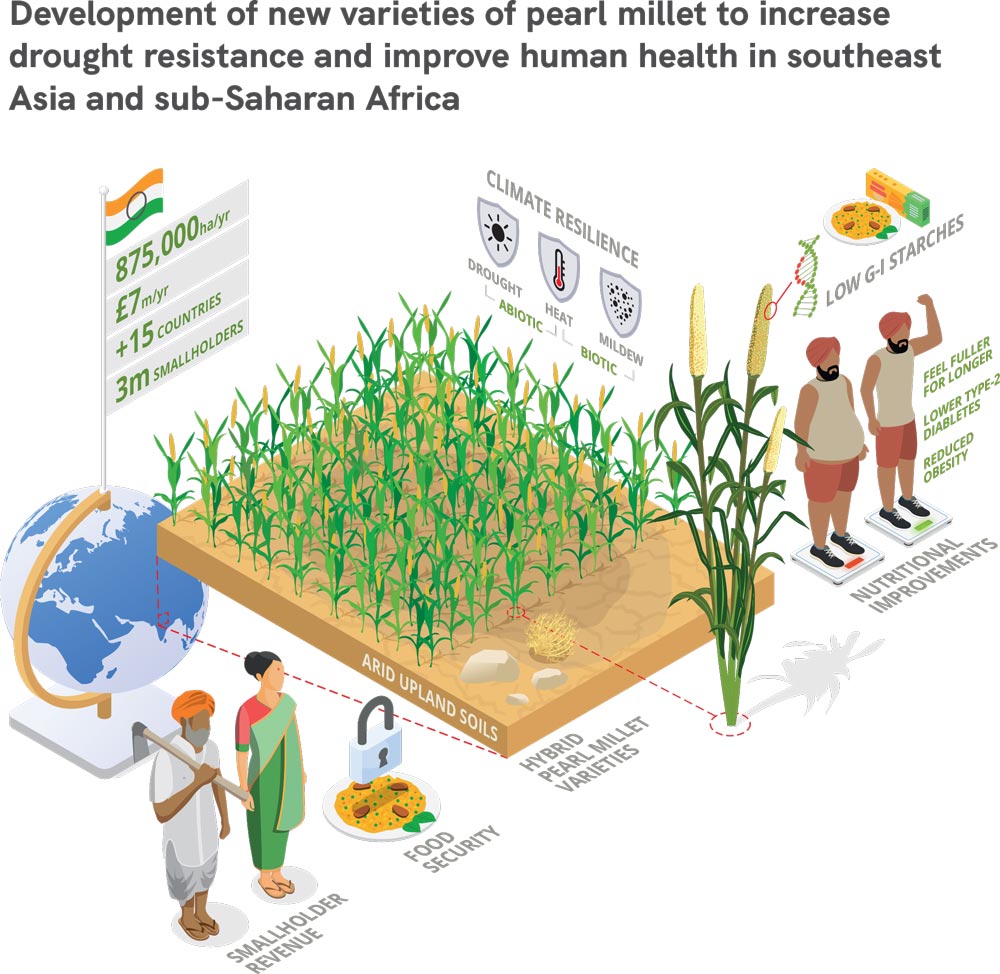Pearl Millet Improvements Impact Case Story
Pearl Millet Improvements

Pearl Millet Improvements: Enhancing Food Security and Nutrition in Challenging Climates
More than 200 million of the world’s poorest and most nutritionally insecure people rely on pearl millet (Pennisetum glaucum) as their main dietary staple.
This resilient cereal crop has a naturally low glycaemic index (GI), meaning it releases energy slowly, helping to control blood sugar levels. It is also exceptionally well adapted to arid uplands that cannot support crops like rice or wheat — making it a crop with excellent food security credentials.
However, even pearl millet is not immune to the pressures of climate change, which brings increasing challenges from:
- Abiotic stresses – drought and heat
- Biotic stresses – notably the downy mildew fungus (Sclerospora graminicola)
IBERS’ Global Collaboration on Pearl Millet Breeding
IBERS scientists have worked closely with partners in India and Africa to improve pearl millet through a combination of:
- Molecular marker technology – to identify and select desirable genetic traits efficiently
- Field-based testing of germplasm and breeding – ensuring varieties perform well under real farming conditions
The first major breakthrough came in 2005 with the release of a downy mildew resistant drought-tolerant variety now grown on more than 875,000 hectares annually in India. This variety generates an additional £7 million per year in income for smallholder farmers — a significant economic boost in rural communities.
Combining Climate Resilience with Nutritional Benefits
IBERS’ current research focuses on combining drought and disease resilience with naturally occurring nutritional traits in pearl millet germplasm.
One key target is maintaining a low glycaemic index while improving tolerance to diseases, heat and drought — a combination that offers dual benefits:
- Public health – helping manage diet-related conditions such as type-2 diabetes and obesity
- Farmer livelihoods – creating a more valuable cash crop
This work has led to the development of a low-GI, drought-adapted hybrid due for release across 15 countries in western Africa before the end of 2025.
Projected Impact
The release of this groundbreaking pearl millet hybrid is expected to benefit over three million smallholder farmers in sub-Saharan Africa by:
- Providing higher value grain for local markets and trade
- Delivering direct nutritional benefits to farming families and communities
- Enhancing food security in climate-stressed regions
IBERS’ work on pearl millet demonstrates how targeted plant breeding — combining advanced molecular tools and germplasm with on-the-ground field trials — can deliver varieties that are not only climate-resilient but also nutritionally superior, creating long-term benefits for both people and the environment.
Downloads
Download our full IBERS Impact Case Stories Booklet here: Innovations for a Changing World Case Story Booklet
